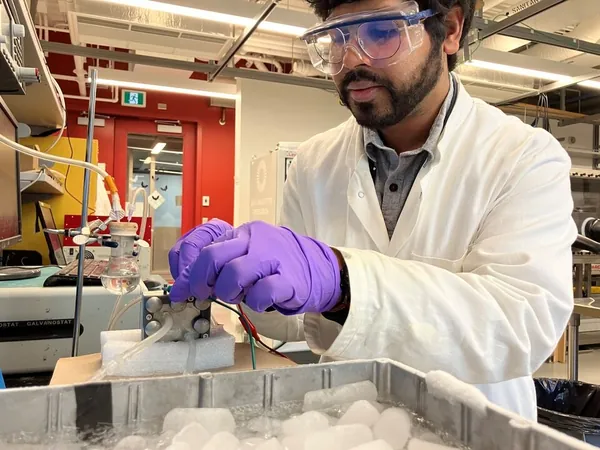
Revolutionary Breakthrough: B.C. Scientists Create Mars Reactor That Can Produce Fuel and More!
2024-11-08
Author: Liam
Introduction
In an exciting development from British Columbia, a team of scientists has unveiled a groundbreaking reactor capable of harnessing chemical reactions to convert atmospheric carbon dioxide into vital resources like plastics, sugars, rocket fuel, and even life-sustaining oxygen. This innovation, spearheaded by researchers at the University of British Columbia (UBC), promises to pave the way for future human colonies on Mars!
Key Features and Functionality
Published last week in the journal Device, this proof-of-concept could reshape interplanetary living, the lead researcher, chemist Abhishek Soni, emphasizes that the reactor requires merely a temperature differential of 50 degrees Celsius to operate efficiently. “Imagine creating a biodome for habitation on Mars,” Soni explained. “Inside would be a comfortable living temperature while outside could plummet to an icy minus 120 degrees Celsius. That temperature span is more than sufficient to drive our CO2 electrolyzers.”
Potential for Space Exploration
This innovation is more than just a laboratory experiment—it's a glimpse into the future of space exploration. The UBC team’s reactor uniquely operates without needing a traditional power source; it utilizes temperature gradients to generate energy. During experiments simulating Martian conditions, the researchers successfully converted waste CO2 to carbon monoxide for four continuous hours. As Martian air consists of 95% carbon dioxide, this technology could enable sustainable resource production for colonists.
Broader Implications
But wait—there's more! The implications of this technology stretch beyond Mars. Curtis Berlinguette, another key scientist involved in the project, has also founded a startup called Sora Fuel. The company aims to produce carbon-neutral jet fuels by harnessing renewable energy from wind and solar sources to extract carbon from the atmosphere. The end goal? Affordable, eco-friendly fuel made from just air, water, and electricity.
Adaptation for Earth
While the UBC team’s technology is designed specifically for Mars, it's worth noting that elements of it could be adapted for Earth. For example, a minor temperature change of just two degrees could generate enough electricity to power lighting or heating systems—an exciting prospect for energy-efficient home technologies. However, for producing fuels and plastics, more extensive energy sources would be required. Establishing reactors at geothermal power plants or in geothermally rich areas—like British Columbia's Mount Currie or the volcanic landscapes of Iceland—would be necessary to meet the energy demands of such production.
Environmental Impact
In terms of environmental impact, Soni highlights the potential for this technology to capture carbon and combat climate change sustainably. Powered by ongoing geothermal energy sources, these thermoelectric generators could operate 24/7, theoretically extracting carbon from the atmosphere. Yet, experts warn that scaling such geoengineering efforts could pose practical challenges.
Cautions from Experts
Berlinguette, while optimistic, urges caution. “While this technology is promising for Martian atmospheres rich in carbon, I don’t suggest it holds the same magic on Earth,” he said. “It’s an alternative lens through which to view our energy dilemmas.”
Conclusion
This remarkable research holds the potential not only to enhance our capabilities on Mars but also offers innovative solutions to some of Earth’s pressing energy challenges. Could we be witnessing the dawn of a new age in space exploration and sustainability? Only time will tell!









 Brasil (PT)
Brasil (PT)
 Canada (EN)
Canada (EN)
 Chile (ES)
Chile (ES)
 España (ES)
España (ES)
 France (FR)
France (FR)
 Hong Kong (EN)
Hong Kong (EN)
 Italia (IT)
Italia (IT)
 日本 (JA)
日本 (JA)
 Magyarország (HU)
Magyarország (HU)
 Norge (NO)
Norge (NO)
 Polska (PL)
Polska (PL)
 Schweiz (DE)
Schweiz (DE)
 Singapore (EN)
Singapore (EN)
 Sverige (SV)
Sverige (SV)
 Suomi (FI)
Suomi (FI)
 Türkiye (TR)
Türkiye (TR)